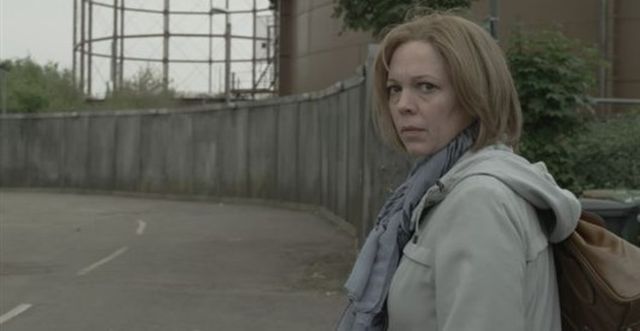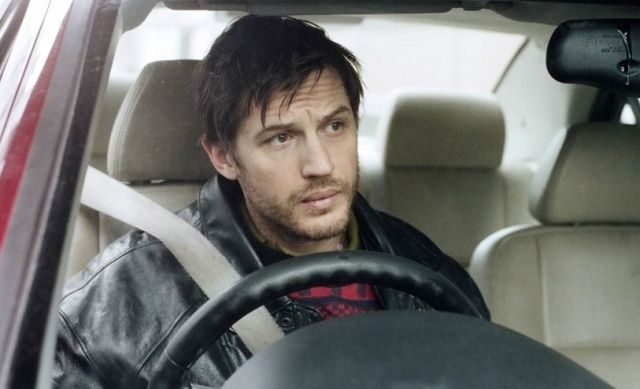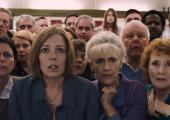So many plays and musicals are adapted from films (Bend it Like Beckham is up next) that it comes as something of a throwback to find a film that takes as its source an acclaimed musical play. The sheer fact that there is a movie of London Road is doubly extraordinary when one considers that the widely acclaimed theatre production from 2011 was anomalous even as a stage show, let alone transposed to the screen. A piece of verbatim theatre conceived very much without take-home numbers but scored to the jagged, often discordant music of the composer Adam Cork, London Road seemed to want to shift the landscape of what the musical theatre could look and sound like. So the happy surprise, from this corner at least, is that the film version is even better.
The writer Alecky Blythe took her tape recorder into the homes of the inhabitants of the Ipswich street that has given the show and now the film its title and was at the epicentre of the shock waves sent out nationally in 2006 when a forklift truck-driver by the name of Steve Wright and from that very road was found guilty of the murder of five prostitutes.
 Weaving a skilfully layered mosaic of reaction and response that ranges from sorrow to outrage, paranoia through to something approaching glee (one chap derides the murdered women as "foul-mouthed slags"), Blythe along with Cork and under the ever-watchful eye of Norris offer a portrait of a community under siege that is seen by the end to begin to heal: hanging baskets full of flowers are co-opted for their full metaphoric weight and then some.
Weaving a skilfully layered mosaic of reaction and response that ranges from sorrow to outrage, paranoia through to something approaching glee (one chap derides the murdered women as "foul-mouthed slags"), Blythe along with Cork and under the ever-watchful eye of Norris offer a portrait of a community under siege that is seen by the end to begin to heal: hanging baskets full of flowers are co-opted for their full metaphoric weight and then some.
Onstage, in fact, the symbolic heft of the floral abundance was itself a bit, um, florid, and there was scant escaping the impression that we were watching a well-drilled team of actors pretending to be characters and a community that they were not. The performances, however technically accomplished, felt as if they were on the outside looking in, and it was difficult not to detect a whiff of condescension surrounding the enterprise, however inadvertent that surely was. (I remember pondering what Mike Leigh might have done with much the same material.)
Well, what a difference a shift in genres can make. Making full use of the panoramic possibilities that film allows, Norris has widened out his perspective to up the emotional stakes while also deepening one's sense of an enclave that risks erosion from within faced with the prospect of a murderer in your midst. Norris's prowling camera teases us from the start with the repeated sight of an apparently solitary man, Dodge (Paul Thornley), who acts as a lightning rod for the gathering alarm that is seen to take over the citizenry as a whole. As before, our way into the narrative is via chatty single mum Julie (Olivia Colman, pictured above), whose gradually evident lack of empathy leads to the single most startling line in the piece – a remark, present as well onstage, that is best discovered for oneself.
 Colman is one of several starry additions to the ensemble that performed the play at the National, who have themselves been retained for the movie but sometimes in a smaller role. Lending putative box office wattage is Tom Hardy (pictured left) in a sturdy seven-minute turn as a know-all cabbie quick to emphasise that just because he has made a study of serial killers doesn't mean he is one. And, in an intriguing demotion of sorts that nonetheless plays to her strengths, the Olivier-nominated stage Julie, Kate Fleetwood, here is seen as the hooded representative of the working girls whose lives have been put at risk, her ever-furtive gaze of a piece with the suspicion that looks to be growing far more quickly (at least at first) than any of those necessarily symbolic baskets.
Colman is one of several starry additions to the ensemble that performed the play at the National, who have themselves been retained for the movie but sometimes in a smaller role. Lending putative box office wattage is Tom Hardy (pictured left) in a sturdy seven-minute turn as a know-all cabbie quick to emphasise that just because he has made a study of serial killers doesn't mean he is one. And, in an intriguing demotion of sorts that nonetheless plays to her strengths, the Olivier-nominated stage Julie, Kate Fleetwood, here is seen as the hooded representative of the working girls whose lives have been put at risk, her ever-furtive gaze of a piece with the suspicion that looks to be growing far more quickly (at least at first) than any of those necessarily symbolic baskets.
Working with an A-list cinematographer in Danny Cohen (Les Misérables), Norris lends a desaturated visual cool to proceedings whose holiday-time occurrences make for some chilling vignettes all their own: the eerie plastic Santa seen in the stage production reappears here, and there's a startling moment – mordantly funny in tone – during "It Could be Him" (one of the song titles) when mannequins in a men's clothing store become objects of suspicion and scorn.
This director's confidence behind the camera exponentially amplified since his wildly OTT debut film Broken three years ago, London Road could be subtitled Restored or Made Whole in its climactic implication that those involved find a way forward, albeit at a grievous price: "it took [the prostitutes'] lives for them to help us," as is made clear. And through it all is Cork's insistent, sometimes jarring, always-arresting soundscape that trades in conventional musical theatre uplift for something more quietly forensic, Cork glimpsed near the end as a pianist who catches the Fleetwood character's eye some while after he and his colleagues have caught us in this rewarding film's grip.
Overleaf: watch the trailer for London Road



 Weaving a skilfully layered mosaic of reaction and response that ranges from sorrow to outrage, paranoia through to something approaching glee (one chap derides the murdered women as "foul-mouthed slags"), Blythe along with Cork and under the ever-watchful eye of Norris offer a portrait of a community under siege that is seen by the end to begin to heal: hanging baskets full of flowers are co-opted for their full metaphoric weight and then some.
Weaving a skilfully layered mosaic of reaction and response that ranges from sorrow to outrage, paranoia through to something approaching glee (one chap derides the murdered women as "foul-mouthed slags"), Blythe along with Cork and under the ever-watchful eye of Norris offer a portrait of a community under siege that is seen by the end to begin to heal: hanging baskets full of flowers are co-opted for their full metaphoric weight and then some.  Colman is one of several starry additions to the ensemble that performed the play at the National, who have themselves been retained for the movie but sometimes in a smaller role. Lending putative box office wattage is Tom Hardy (pictured left) in a sturdy seven-minute turn as a know-all cabbie quick to emphasise that just because he has made a study of serial killers doesn't mean he is one. And, in an intriguing demotion of sorts that nonetheless plays to her strengths, the Olivier-nominated stage Julie, Kate Fleetwood, here is seen as the hooded representative of the working girls whose lives have been put at risk, her ever-furtive gaze of a piece with the suspicion that looks to be growing far more quickly (at least at first) than any of those necessarily symbolic baskets.
Colman is one of several starry additions to the ensemble that performed the play at the National, who have themselves been retained for the movie but sometimes in a smaller role. Lending putative box office wattage is Tom Hardy (pictured left) in a sturdy seven-minute turn as a know-all cabbie quick to emphasise that just because he has made a study of serial killers doesn't mean he is one. And, in an intriguing demotion of sorts that nonetheless plays to her strengths, the Olivier-nominated stage Julie, Kate Fleetwood, here is seen as the hooded representative of the working girls whose lives have been put at risk, her ever-furtive gaze of a piece with the suspicion that looks to be growing far more quickly (at least at first) than any of those necessarily symbolic baskets.



 Bruce's spirits are lifted by the arrival of new manager Julia (Rashida Jones, pictured right) - and when he finds out she salsas, well then it's back on with the dancing shoes. Ian McShane is interestingly cast as a curmudgeonly dance teacher with whom Bruce reconnects, with
Bruce's spirits are lifted by the arrival of new manager Julia (Rashida Jones, pictured right) - and when he finds out she salsas, well then it's back on with the dancing shoes. Ian McShane is interestingly cast as a curmudgeonly dance teacher with whom Bruce reconnects, with 
